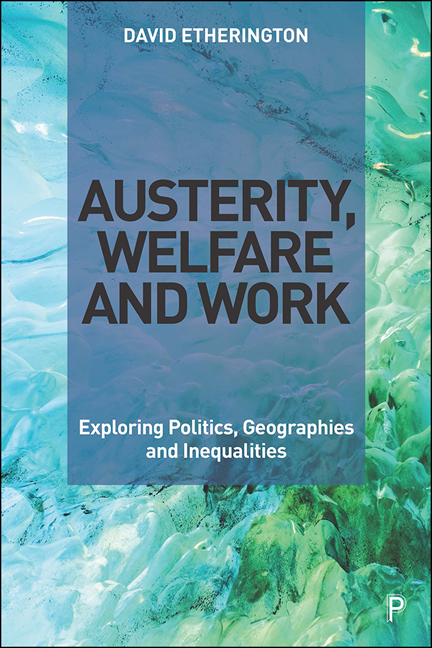Book contents
- Frontmatter
- Dedication
- Contents
- List of Tables and Box
- List of Abbreviations
- Notes on the Author
- Acknowledgements
- Preface
- 1 Introduction: the Crisis and Austerity Neoliberalism
- 2 Conceptualising Austerity, Welfare and Employment Relations
- 3 Embedding Neoliberal Austerity: from New Labour to the Conservative Government
- 4 Resisting Welfare Reforms and Work-First Policies
- 5 ‘Devolving’ Welfare Policies in Greater Manchester’s Precarious Economy
- 6 Challenging Welfare Conditionality and Insecure Work
- 7 Towards a more Inclusive Labour Market: Lessons from Denmark
- 8 Conclusions: Progressive Alternatives to Austerity
- Notes
- References
- Index
3 - Embedding Neoliberal Austerity: from New Labour to the Conservative Government
Published online by Cambridge University Press: 10 March 2021
- Frontmatter
- Dedication
- Contents
- List of Tables and Box
- List of Abbreviations
- Notes on the Author
- Acknowledgements
- Preface
- 1 Introduction: the Crisis and Austerity Neoliberalism
- 2 Conceptualising Austerity, Welfare and Employment Relations
- 3 Embedding Neoliberal Austerity: from New Labour to the Conservative Government
- 4 Resisting Welfare Reforms and Work-First Policies
- 5 ‘Devolving’ Welfare Policies in Greater Manchester’s Precarious Economy
- 6 Challenging Welfare Conditionality and Insecure Work
- 7 Towards a more Inclusive Labour Market: Lessons from Denmark
- 8 Conclusions: Progressive Alternatives to Austerity
- Notes
- References
- Index
Summary
Under Blair, the social exclusion agenda understood that the most excluded need different forms of support than the post-war settlement of welfare state plus universal public services could provide. But its mistake was to paint a picture of 2.5 per cent of the population as fundamentally different to the rest because of disaffection, social dysfunction or lack of opportunity … The Coalition's ‘Social Justice’ strategy also focuses on a narrow group facing entrenched social disadvantage and poverty, the causes of which are attributed to family breakdown, substance misuse, crime, debt and welfare dependency, while neglecting wider economic inequalities such as in-work poverty and structural unemployment. The lesson of the past decade or so is that both approaches lead to a settlement for the most disadvantaged that is residualised and unstable. (McNeil, 2016: 22)
Introduction
The construction of the post-war UK welfare state involved significant gains for the working class in Britain and there is no doubt about the influence of Keynesian politics on redistribution as reflected in the expansion of welfare services. Industrial policy and economic planning were seen as key to funding and sustaining the welfare state. This brought about the nationalisation of the railways, coal and steel industries and the attempts to adopt national economic planning strategies geared to industrial modernisation. The purpose of this chapter is to provide a context and reference point to the book by exploring the development and implementation of neoliberalism in the UK with a special focus on welfare reform and employment relations.
The post-war settlement also involved significant developments within the field of industrial relations and trade unions were viewed as an important actor in the formation of the welfare state even by post-war Conservative governments. Trade union membership increased from just over 9 million members in 1948 to just over 12 million in 1979, with the fastest rate of growth occurring during the 1970s (Hyman, 1989: 233). The UK is based on a voluntarist model with a minimal role for state involvement. There were no established laws on the requirements of collective agreements, and these had to be negotiated between employers and trade unions. The post-war welfare settlement involved major redistribution towards the working class and for a period guaranteed rising standards of living and a buoyant labour market.
- Type
- Chapter
- Information
- Austerity, Welfare and WorkExploring Politics, Geographies and Inequalities, pp. 47 - 70Publisher: Bristol University PressPrint publication year: 2020



